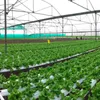How four friends built a successful greenhouse farming startup from a Chikmagalur coffee estate
Bengaluru-based agritech startup Clover began from a family-owned coffee estate in 2018. In two years, it has seen a 14x growth in its greenhouse-grown produce.
Ventures was started by childhood friends Avinash BR, Gururaj Rao, Arvind Murali, and Santhosh Narasipura, who grew up in Bengaluru, went their own ways in between, and finally, returned to settle down in their hometown in 2017.
The startup borrows its name from the four-leaf ‘clover’ plant, which is said to be the harbinger of good luck; it is also an ode to the bond shared by the four friends.

The founders of Clover
Santhosh, one of the co-founders, owned a coffee estate in Karnataka’s Chikmagalur district. But he had no visibility on what was happening to the crop, and had to “blindly” wait for sunlight and rainfall.
Avinash, Co-founder and CEO, Clover, tells YourStory,
“The sheer unpredictability of the yield, the right time to sell the produce, and the complete absence of technology stood out for us.”
Since the friends-turned-founders already had access to a large land parcel, they decided to do some farming, but in an unconventional way.

Clover grows 40 SKUs in its greenhouses in Karnataka
Avinash, who’d earlier been a part of early-stage VC firm Aavishkaar, was acquainted with greenhouse farming (also known as indoor farming) where crops are grown in controlled micro-environments.
He shares,
“Our problem statement was if we could escape middlemen and grow fresh produce of a certain quality around the year in a controlled environment. We spoke to chefs, retailers, internet kitchens, and procurement teams to understand the market. What we realised is that to scale up vertical farming, we needed more greenhouses — India already had 20,000+ hectares of them. So, instead of building our own greenhouse, we decided to partner with farmers.”
Thus began Clover’s journey; the agritech startup launched operations in 2018.
How Clover fixes the supply chain
Clover partners with small farmholders, and grades, packages, and sells their premium quality, greenhouse-grown fresh produce — lettuce, basil, spinach, coriander, zucchini, beans, cauliflower, etc. — through B2B and B2C channels.
Farmers in Clover’s network typically hold one to two acres of farmland, where demand-led cultivation is done using its full-stack agronomy solutions, consumption prediction and traceability, and end-to-end farm management services.

Clover holds 70+ acres of farmland
The startup essentially organises the vast number of scattered greenhouse farmers in the country, drives standardisation across yields, improves productivity, reduces wastage of perishable produce, and ensures consistency for end consumers.
Avinash explains,
“On the consumer side, quality and year-long availability [of fresh produce] were the primary challenges we wanted to solve. For farmers, we fixed some of their core issues like what to grow, how to grow, and where to sell to. And in greenhouse farming, you don't need to douse the produce with pesticides and fertilisers. So, we are also helping farmers grow cleaner produce.”
Clover also picks up the produce from the greenhouses, transports it to its own warehouses (two in Bengaluru, one in Hyderabad), and delivers it to customers, which include cloud kitchens, fine dining outlets, modern retailers, and food processors.
Business growth and COVID-19 impact
Clover owns more than 70 acres of farmland in and around Bengaluru. Its greenhouses are located 100-120 kilometres away from the demand centres.
The startup grows 40 SKUs, mostly perishable vegetables, and looks to add more varieties. It is also setting up farm clusters in Hyderabad before launching operations.
In the two years leading up to the COVID-19 outbreak, Clover claims to have reported a 14x growth in fresh produce, and an 8x increase in topline.

Clover grades, packages, and sells the farmers' fresh produce
However, following the pandemic-led lockdown, demand dipped significantly on the B2B front, especially from its restaurant and cloud kitchen partners that accounted for the biggest chunk of the business.
Avinash shares, “There was a complete lack of certainty on that front with many restaurants shutting down. In the first few weeks of the lockdown, vehicle and people movements were also restricted. So, operating warehouses was a battle.”
While B2B was struggling, B2C gained significant ground as consumers became increasingly fussy about hygiene and the source of the produce they took home.
“There was a non-linear increase in demand from general trade and modern retail like Nature’s Basket — one of our biggest customers — as the focus on cleanliness shot up and there was enhanced awareness on eating right,” shares the founder.

Clover Co-founder and CEO Avinash BR
To make the most of the changing food retail landscape, Clover is shifting its focus to B2C until the B2B demand stabilises.
The startup is already delivering fresh produce to 40-odd residential complexes in Bengaluru at the behest of RWAs. It plans to ramp up these direct-to-consumer (D2C) deliveries in the coming weeks, and will also launch its online ordering app.
Talking about the shift, Avinash says,
“B2C will be our focus in the foreseeable future as the demand for clean-sourced, high quality produce goes up. The soul of our organisation will change from predominantly B2B to predominantly B2C. Even though some QSRs have started opening up again, we expect normalcy [in the B2B segment] to be restored around Diwali. Until then, we’re expecting about 40 percent of the demand.”

The farmer-side platform interface of Clover
Investors believe that despite the COVID-19 intervention, food supply will remain unaffected owing to its ‘essential’ nature, and will continue to create new opportunities.
Vinod Murali, Managing Partner of Alteria Capital (which recently backed Clover), says,
“Agritech is a segment which continues to see tailwinds despite COVID-19-related issues, and Clover provides high-quality produce consistently, which is at an even higher premium currently.”
Funding and competitive landscape
Back in 2018, Clover received a seed capital of $1.2 million from Accel and Mayfield while in stealth mode in 2018. This year, it has raised two rounds of funding to chart out the B2C roadmap.
In May, it received Rs 7 crore in debt funding from Alteria Capital. Prior to that, in February, the startup raised Rs 39 crore ($5.5 million) in a Series A round from Omnivore (an agritech-focused fund), along with participation from existing investors Accel Partners and Mayfield.
Mark Kahn, Managing Partner of Omnivore, said,
“We believe that Clover is building India’s first fresh produce supply chain adapted to the challenge of climate change. By leveraging peri-urban greenhouses, Clover can deliver the highest quality vegetables and fruits to B2B and B2C consumers in India’s largest metro areas.”
Clover plans to use the capital to scale up its B2C operations, enter new metro markets, grow its farm network, and ramp up its team across divisions.

India has 20,000+ hectares of greenhouse farms
The startup operates in a global greenhouse farming market estimated to be worth $30 billion in 2020, according to Grand View Research.
The increasing awareness about the advantages of this form of cultivation over traditional farming methods is driving the growth. Greenhouse farming also conserves water and land, reduces pesticide use, and solves issues of climate change.
In the farm-to-fork supply chain, Clover competes with the likes of , , , Freshfalsabzi, Farmpal, Harabaag, SuperZop, and others, who’re looking to organise nearly 21 million farmers across the country.
Avinash sums up Clover’s near-term vision by saying, “We’re well capitalised for the next nine to 12 months as we scale up our B2C business in the new normal.”
(Edited by Teja Lele Desai)






1564671114666.png?fm=png&auto=format&h=100&w=100&crop=entropy&fit=crop)





